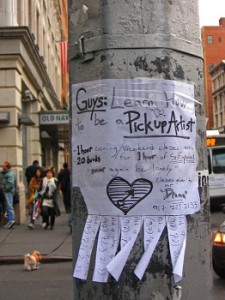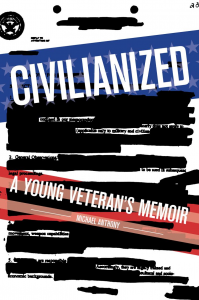[Note: Since the publication of my newest book, Civilianized, many of you have sent emails asking for this blog post, so here it is.]
 It’s no big secret that men’s and women’s brains are wired differently, but that clearly hasn’t deterred many a man from trying to understand certain key processes of a woman’s mind, specifically the parts of it that will enable him to get into her good graces (and other things besides).
It’s no big secret that men’s and women’s brains are wired differently, but that clearly hasn’t deterred many a man from trying to understand certain key processes of a woman’s mind, specifically the parts of it that will enable him to get into her good graces (and other things besides).
For centuries, the art of seduction was a mystery to most men. While it was initially assumed that women would favor the best-looking, the most dominant, and the wealthiest among the opposite gender, history tells that this is not always the case. Many of the most successful seductions throughout history were conducted not by alpha males, but by seemingly shy and perhaps even unconventional-looking men. Casanova, (whose name is forever immortalized in the dictionary as a term for “a man who has many conquests or lovers”), for instance, used a variety of mental and psychological seduction techniques rather than make use of any overt quality to win over his quarries.
This sort of strategy would serve as the basis for many pick-up artist techniques, but their ilk would not surface until a few centuries later. Shortly before the late 20th century, most Americans faced extremes when looking about for advice on dating and relationships. On the one hand, there was Dear Abby. This advice column was a beloved institution dishing out wholesome advice on common dating dilemmas. While it was considered to be a “safe” option, the Dear Abby advice column was primarily written for women (which was hardly surprising as a woman was also behind the column).
On the other end of the spectrum were the more informal sources of counsel. These generally involved a wide range of sources from what was usually referred to as “locker room talk,” where adolescent boys with raging hormones dished out stories about conquests (be they actual or imagined) and advice on how to achieve the same, to one-on-one sessions with a much older mentor who had been around the block once or twice. Young men, at least those who were in America, clearly needed a happy medium.
The pick-up artist industry, as people know it today, was said to have originated back in 1970, when Eric Weber’s “How to Pick Up Girls” was published. This tome was initially endorsed by a prevailing racy adult magazine, which derived some of its articles from material found in the said book. Up until this point, the only acceptable dating topics discussed in modern publications were innocent questions that involved how long a gentleman should wait before he could kiss his date on the cheek after bringing her home. Weber’s book was the first widely published work that unabashedly dished out tips for red-blooded males in search of little more than a roll in the sack with an attractive female.
In true 1970s style, Weber advised the wearing of bell bottoms and even participating in peace marches with the primary objective of seducing hot, young female hippies all in the name of “free love.” “How to Pick Up Girls” would later go on to inspire the flourishing of the pick-up artist movement underground throughout the rest of the decade.
The movement slowed down upon the onset of the 1980s, as some unsavory consequences of events in the past decade set in. The conservative Ronald Reagan was elected into the White House and rock ‘n’ roll was all but verboten in many households with concerned parents in charge. The “Free Love” movement of the 70s, (which encouraged unrestricted and indiscriminate sexual activity), along with the influence of the freewheeling and reckless lifestyles of the era’s rock stars, led to sexually transmitted diseases like AIDS and HIV being more widespread along the population.
For most of the 1980s, the looming threat of AIDS put many people off pick-up artistry and dating advice again favored safer practices. Ironically, however, the seduction experts would form an organized community for the first time by the end of this decade.
It all began with an American author named Ross Jeffries. As a self-described “speed seduction expert,” Jeffries relied heavily on neuro-linguistic programming to attract and seduce women. His technique was akin to hypnosis, wherein a man would help a woman access a positive mind state or mood. The goal was for the target to later associate such pleasurable emotions with the seducer. Following typical neuro-linguistic programming principles, Jeffries was also renowned for his way with words as he could craft them into phrases that were calculated to instigate the aura of sexual desire in a person.
While Jeffries’ approach was considered to be controversial, he is often credited as the “father” or founder of the modern seduction community. Jeffries would later parlay his 15 minutes of fame by offering seduction seminars and other related products to his fellow men, most of who were confused about whether women wanted the old-fashioned, tough, macho man or the feminism-approved sensitive guy of the New Age. His gamble was a success, and he later published a book called “How to Get the Women You Desire Into Bed.” Apart from being the first man to build a business model around pick-up artistry, Jeffries would also gain fame and notoriety as the real-life basis for Tom Cruise’s disillusioned pick-up artist character in the movie “Magnolia.”
Those who found Jeffries’ method to be a little too ruthless (his primary focus was always on bedding a woman) opted for the somewhat diluted technique of David DeAngelo. DeAngelo’s “Double Your Dating” seminars and DVD sets catered to clueless, “nice” young men who were wondering why their female peers preferred their cocky counterparts. He favored adopting a cocky and funny personality in favor of a fawning one when it came to hitting on attractive women.
One of DeAngelo’s most renowned contributions to the pick-up artist’s bag of tricks was called “negging.” This involved giving a back-handed compliment to a sought-after lady to get her attention. An example of negging often included telling an undeniably beautiful girl that she was “as cute as my obnoxious little sister.” While this approach did pique the attention of certain women who were used to getting their way with most men (and thus viewed those who didn’t fall at their feet as an attractive challenge), it garnered quite a bit of negative press for its inventor. Too often, inexperienced novices who were fresh off DeAngelo’s seminars would “neg” women who were less attractive and insecure, making them feel upset rather than intrigued. Some neophytes botched the technique further by spewing outright insults at their targets rather than tweaking their compliments to generate a bit of insecurity to make the quarry a lot more approachable.
Still, DeAngelo proved that there’s really no such thing as bad press when he successfully marketed his seduction seminars and DVDs and built a thriving business empire off the proceeds. And, more importantly for the pick-up artist community, the road blazed by Jeffries and DeAngelo gave rise to numerous Internet message boards where young men discussed and exchanged ideas about dating, specifically about landing and pleasing a woman in bed.
Out of this veritable pool of pick-up artistry talent emerged one of the most flamboyant pick-up artists. Born Eric von Markovic, the young Canadian pick-up artist known by his alias “Mystery” would make waves by patterning his image contrary to the stereotypical pick-up artist’s. Rather than dressing up in the sleek dark suits or the preppy chinos and polo shirt combo of the typical pick-up artist, Mystery walked the streets in top hats, platform boots, and even outrageous feather boas. This practice, known as “peacocking,” relied greatly on shock value and on catching the eye of any female (or anyone for that matter) passing by. He would further engage his target by performing various sorts of magic tricks to the delight of many young women.
The much talked-about “three-second rule” is also credited to Mystery. This is all about being spontaneous and confident as it means walking up and talking to the first group of people you see or the first woman that catches your eye within three seconds of entering a room. The logic behind this approach is that women can sense if you had to work up the courage to move toward them, and this often lowers their perception of you. If, on the other hand, you simply followed the three-second rule, there would be no room for hesitation and you would breeze into the interaction with more confidence, which your target would thus appreciate more.
The year 2005 marked the entry of pick-up artists into mainstream consciousness. This sort of movement had been brewing for a while, what with the online seduction community (by now known simply as “The Community”) growing steadily over the past decade. The Community had given rise to a great number of pick-up gurus, who favored varying methods of picking up women.
It was the author Neil Strauss who exposed the techniques of Mystery and his cadre (along with their real-life experiences on the street). His book, “The Game: Penetrating the Secret Society of Pickup Artists ” illustrated the previously well-guarded secrets of the underground seduction community. It even provided a narrative on Strauss’ two years of practicing such techniques on the crème de la crème of L.A.’s female population.
” illustrated the previously well-guarded secrets of the underground seduction community. It even provided a narrative on Strauss’ two years of practicing such techniques on the crème de la crème of L.A.’s female population.
With such an illustrious track record, Strauss had no difficulty persuading his clientele that even the most awkward geeky male specimen could turn into a polished pick-up artist once he was exposed to the right guidance. Thanks to his new street credentials, Strauss was able to put up the Stylelife Academy, where he continues to educate aspiring pick-up artists on the tricks of the trade.
Today, the pick-up artist community is widely shrouded in controversy. Lots of women consider their practices to be sexist and unnecessarily aggressive. However, there have been some movements that have taken a leaf out of the pick-up artist playbook but modified it to make their “strategies” more chivalrous or considerate. Clearly, there will always be a need for such “guidance” so long as the comprehension gap between male and female brains remains significant.
Picture: Flickr/Pazzia
Civilianized: A Young Veteran’s Memoir
In this dark humored War Memoir, Iraq veteran Michael Anthony discusses his return home from war and how he turned to the Pick-Up Artist Community to help defeat his PTSD.
 “An intense memoir.” -Kirkus
“An intense memoir.” -Kirkus
“I wont soon forget this book.” -Mary Roach
“A must read.” -Colby Buzzell
“[S]mart and mordantly funny.” –Milwaukee Journal Sentinel
“Anthony delivers a dose of reality that can awaken the mind…” Bookreporter

 It’s no big secret that men’s and women’s brains are wired differently, but that clearly hasn’t deterred many a man from trying to understand certain key processes of a woman’s mind, specifically the parts of it that will enable him to get into her good graces (and other things besides).
It’s no big secret that men’s and women’s brains are wired differently, but that clearly hasn’t deterred many a man from trying to understand certain key processes of a woman’s mind, specifically the parts of it that will enable him to get into her good graces (and other things besides).